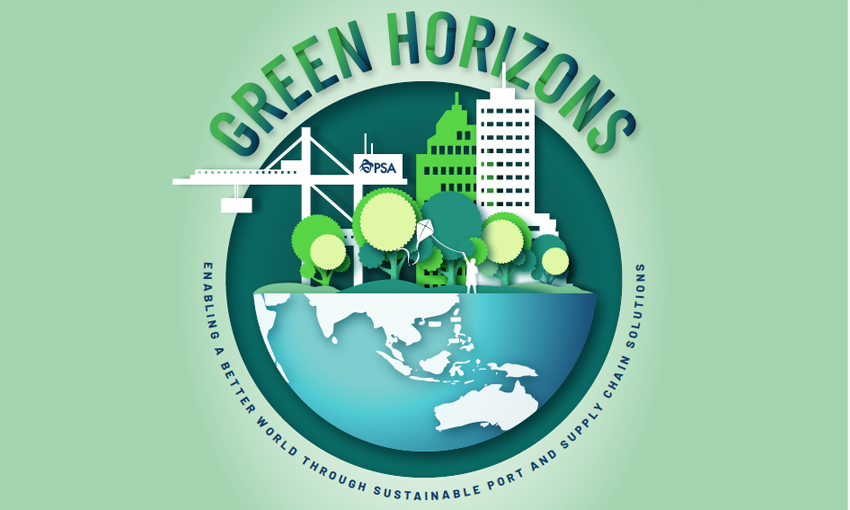PSA International has launched its inaugural sustainability report 2020 entitled Green Horizons: Enabling a Better World Through Sustainable Port and Supply Chain Solutions, covering the period 1 January to 31 December, 2020
The group aims to reduce absolute Scope 1 and 2 carbon emissions by 50% by 2030, and by 75% by 2040, against a 2019 baseline year. And, achieve net zero carbon emissions by 2050.
It aims to establish a Scope 3 inventory by 2022 as a first step towards setting a Scope 3 emissions reduction target.
By 2024, PSA plans to implement 10 supply chain projects that provide sustainable logistics and transport solutions impacting at least 3,000 TEUs of cargo volume per project.
It will aim for 90% rubber tyred gantry cranes to be electric or hybrid by 2030 and to procure only hybrid or full electric new RTGs from 2023 onwards.
With flagship operations in Singapore and Antwerp, PSA’s global network encompasses over 50 locations in 26 countries around the world. The group’s portfolio comprises more than 60 deepsea, rail and inland terminals, as well as affiliated businesses in distriparks, warehouses and marine services.
PSA has made investments and spearheaded innovations to bring about rapid decarbonisation of its operations already, including progressive electrification of its equipment and test-bedding of alternative energy vectors like hydrogen.
The company said Tuas Port in Singapore will also showcase the latest climate technologies, and “set the standard for sustainable port operations”.
The group’s sustainability strategy framework focuses on the priorities of taking climate action; transforming supply chains; and nurturing a future-ready workforce, underpinned by a commitment to steward responsible business practices across the group consistently and coherently.
Peter Voser, group chair of PSA said, “Launching our first sustainability report this year is both timely and significant. As we look to recover and emerge stronger from the pandemic, PSA has a unique opportunity to contribute to a more resilient and sustainable global economy.
“We believe that sustainability is not merely an option but our responsibility.
“I would like to thank all of our people and our partners for being with us on this journey, and am hopeful that our collective efforts will contribute towards securing a better future for everyone.”
PSA’s sustainability report aligns with international reporting frameworks, including Global Reporting Initiative standards and the Task Force on Climate-related Financial Disclosures.
The company has also developed its sustainability framework with the Sustainable Development Goals in mind. In particular, it has identified SDGs 7, 8, 9, 11, 12 and 13 as areas towards which PSA can make the most significant contributions.
Tan Chong Meng, group CEO said, “This report reflects our commitment and ambition to be a global leader in climate action and to drive sustainable growth in the port and logistics industry.
“On top of building our digital capabilities to enhance supply chain resilience, we are also striving to innovate new cargo solutions to enable greener logistics choices for supply chain users, especially shippers who are similarly concerned about climate change.”
“We are actively driving greater collaboration within the industry, for we believe that collective action is key to any sustainable change.”
More on emissions
The total Scope 1 and 2 emissions of the PSA group in 2020 were 732,000 tonnes CO2-e, a 0.5% increase on 2019. The increase resulted from acquisitions and expansion into intermodal businesses, as well as higher reefer volume and dwell time in PSA’s ports due to COVID-19 related events.
Based on the total emissions profile in 2020, the majority of PSA’s GHG emissions are attributed to the operations of its container terminals, accounting for 87% of the group’s total GHG emissions. Marine services accounted for 12%, with the remaining emissions arising from PSA’s operations in the non-container terminals, logistics services and IT businesses.
In 2020, Scope 1 emissions accounted for 63% of total Scope 1 and 2 emissions, with Scope 2 emissions making up 37%. The bulk of Scope 1 emissions resulted from the operation of equipment including prime movers, diesel yard cranes and marine vessels. Scope 2 emissions resulted from electricity consumption in operating quay cranes, reefer points, electric yard cranes and terminal buildings.
Examples of energy-saving initiatives include the introduction of variable speed drive control for diesel-powered RTGs; use of LED lights for cranes and buildings; lighting optimisation for automated yard cranes; automatic switching off of auxiliary systems when equipment are inactive for a defined period of time; and workload optimiser installation in yard cranes to optimise jobs assigned for lowest prime mover waiting time or crane gantry distance, to reduce unproductive energy consumption.
The company is also operating two dual-fuel LNG harbour tugs, PSA Aspen and PSA Oak, joining the Singapore harbour tug fleet in 2019 and 2020, with an estimated reduction in carbon dioxide emissions of up to 20%.


